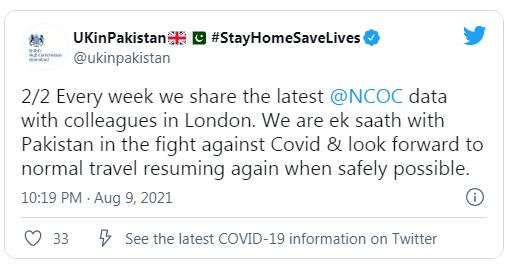LONDON, AUG 10: The British High Commission in Pakistan on Monday said that the decision to keep the country on the red list, under the coronavirus travel restrictions, was based on data and science.
The British government placed Pakistan and India on the red list on April 2 and 19, respectively. However, in an updated list, the government announced that India, Bahrain, Qatar and the UAE would be moved to the amber list from August 8.
A day earlier it was reported that UK senior health official JO Churchill said that Pakistan was being retained on Britain’s “red list” due to the “worsening Covid-19 situation and low testing rates”.
The decision was met with backlash from the Pakistani public and politicians alike who termed it unjust. Human Rights Minister Shireen Mazari criticised the British government, calling the measure ‘ridiculous’.
“UK gov[ernmen]t, dominated by Indophiles and despite globally documented India’s continuing disastrous handling of Covid pandemic, moved India to Amber List but keeps Pak on Red [list]; then under pressure from Opp[osition] MPs gives feeble excuse Pak didn’t share data,” Minister Mazari said in a tweet.
She further stated that the British government had never asked for Pakistan’s Covid-19 data which was already publicly available as the National Command and Operation Center (NCOC) has a centralised database, which is updated daily and added that it was also being shared with the UK High Commission.
“Earlier UK govt had given another excuse – that more Pak passengers than Indians tested positive! Shifting goalposts!” the minister added.
“We are proud of our people-to-people links with our 1.6m diaspora at the heart of our relationship. We recognise that many people are disappointed that Pakistan remains on the UK’s Covid red list,” the British High Commission in Pakistan wrote on its official Twitter handle late on Monday.

It said that the decision to keep Pakistan on the red list is based on data and science. “Every week we share the latest NCOC data with colleagues in London. We are ek saath (together) with Pakistan in the fight against Covid & look forward to normal travel resuming again when safely possible,” it wrote in another tweet.

In a letter dated August 6, Churchill while explaining the reason for keeping Pakistan on the red list of countries said the UK’s Joint Biosecurity Centre continues to assess risk based on factors including incidence, trends in deaths/hospitalisations, exported cases as well as testing and test positivity rates.
Her response comes after Pakistan including several members of the British House of Commons slammed the UK government for keeping Pakistan on its red list of countries at the latest coronavirus travel update while removing India from it.
“In Pakistan, the combination of a deteriorating epidemiological situation, combined with low testing rates and limited genomic surveillance, presents a high risk that an outbreak of a new variant, or existing VoC [variant of concern], will not be identified before it is imported to the UK,” she said in a letter.
The red list of the countries means only the UK nationals and those with residency rights will be allowed to travel to the country if they stayed in Pakistan in the 10 days before they arrive. The amber travel list means that returnees can quarantine at home, rather than in a hotel.
Britain’s MP Yasmin Qureshi had termed the move to keep Pakistan on the red list while downgrading India “a clear and blatant discrimination towards Pakistan”.











